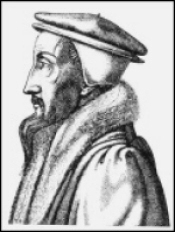Calvin and the Reformation
Digital Logos Edition
Overview
James MacKinnon’s Calvin and the Reformation contains a study of Calvin’s role in the Reformation, including his influence upon subsequent generations of Reformers during the latter sixteenth and seventeenth centuries. This important volume places Calvin in his proper theological and political context.
This title is included in the following collections
You can save when you purchase this product as part of a collection.
Timeline Collection (18 resour...
$372.80$109.99Timeline Feature Expansion, S
$199.99$129.99Calvin and the History of Calv...
$189.99$189.99Reformed Theology Bundle (74 v...
$880.80$527.99
- $768.41$536.99
- $599.99
- $1,499.99$1,199.99
- $2,999.99$2,249.99
- $15,739.84$2,360.50
- $2,999.99
- $2,999.99
- $2,999.99
- $4,749.99$3,562.49
- $4,749.99
- $4,749.99
- $4,749.99
- $23,999.99$17,999.99
- $21,749.99
- $24,999.99

...Calvin’s theology interests us in its historical context as an outstanding record of Reformation theology that historically—and at times even legally—has served as a basis of proclamation in modern Protestant churches.
—Karl Barth, author, Church Dogmatics, The Epistle to the Romans
Calvin helped the Reformation change the entire focus of the Christian life. Calvin’s teaching, preaching, and catechizing fostered growth in the relationship between believers and God.
—Joel R. Beeke, President and Professor of Systematic Theology, Church History, and Homiletics, Puritan Reformed Theological Seminary, Grad Rapids, Michigan
The Institutes is a strongly personal book. The author addresses his readers directly. . . . It is this immediate, engaging style that has no doubt contributed so much to the power and attraction of the Institutes over the years.
—Paul Helm, Teaching Fellow at Regent College, Vancouver, British Columbia
Calvin’s theological heritage has proved fertile perhaps to a greater extent than any other Protestant writer. Richard Baxter, Jonathan Edwards, and Karl Barth, in their very different ways, bear witness to the pivotal role that Calvin’s ideas have played in shaping Protestant self-perceptions down the centuries. . . . It is impossible to understand modern Protestantism without coming to terms with Calvin’s legacy to the movement which he did so much to nourish and sustain.
—Alister E. McGrath, Professor of Theology, Ministry and Education, and Head of the Centre for Theology, Religion and Culture at King's College, London, England
The fundamental issue for John Calvin—from the beginning of his life to the end—was the issue of the centrality and supremacy and majesty of the glory of God.
—John Piper, Pastor for Preaching and Vision at Bethlehem Baptist Church in Minneapolis, Minnesota
John Calvin is a man of distinguished reputation, one of the great figures of church history.
—Wulfert de Greef, PhD from the University of Utrecht, Netherlands
It would hardly be too much to say that for the latter part of his lifetime and a century after his death John Calvin was the most influential man in the world, in the sense that his ideas were making more history than those of anyone else during that period. Calvin’s theology produced the Puritans in England, the Huguenots in France, the ‘Beggars’ in Holland, the Covenanters in Scotland, and the Pilgrim Fathers of New England, and was more or less directly responsible for the Scottish uprising, the revolt of the Netherlands, the French wars of religion, and the English Civil War. Also, it was Calvin’s doctrine of the state as a servant of God that established the ideal of constitutional representative government and led to the explicit acknowledgment of the rights and liberties of subjects. . . . It is doubtful whether any other theologian has ever played so significant a part in world history.
—J. I. Packer, Board of Governors' Professor of Theology at Regent College, Vancouver, British Columbia
[Calvin] easily takes the lead among the systematic expounders of the Reformed system of Christian doctrine. . . Calvin’s theology is based upon a thorough knowledge of the Scriptures. He was the ablest exegete among the Reformers, and his commentaries rank among the very best of ancient and modern times. His theology, therefore, is biblical rather than scholastic, and has all the freshness of enthusiastic devotion to the truths of God’s Word. At the same time he was a consummate logician and dialectician. He had a rare power of clear, strong, convincing statement. He built up a body of doctrines which is called after him, and which obtained symbolical authority through some of the leading Reformed Confessions of Faith.
—Philip Schaff, author, History of the Christian Church
What is it about Calvin that so inspires me? This: his disciplined style, his determination never to speculate, his utter submission to Bible words as God's words, his submission to Christ's Lordship, his sense of the holy, his concern to be as practical as possible; the fact that godly living was his aim and not theology for the sake of it. In a forest of theologians, Calvin stands like a Californian Redwood, towering over everyone else.
—Derek Thomas, Professor of Systematic and Practical Theology at Reformed Theological Seminary, Jackson, Mississippi
The greatest exegete and theologian of the Reformation was undoubtedly Calvin. . . . He is one of the greatest interpreters of Scripture who ever lived. He owes that position to a combination of merits. He had a vigorous intellect, a dauntless spirit, a logical mind, a quick insight, a thorough knowledge of the human heart, quickened by rich and strange experience; above all, a manly and glowing sense of the grandeur of the Divine. The neatness, precision, and lucidity of his style, his classic training and wide knowledge, his methodical accuracy of procedure, his manly independence, his avoidance of needless and commonplace homiletics, his deep religious feeling, his careful attention to the entire scope and context of every passage, and the fact that he has commented on almost the whole of the Bible, make him tower above the great majority of those who have written on Holy Scripture.
—Frederic William Farrar, English clergyman and author
- Title: Calvin and the Reformation
- Author: James MacKinnon
- Publication Date: 1936
- Pages: 302
